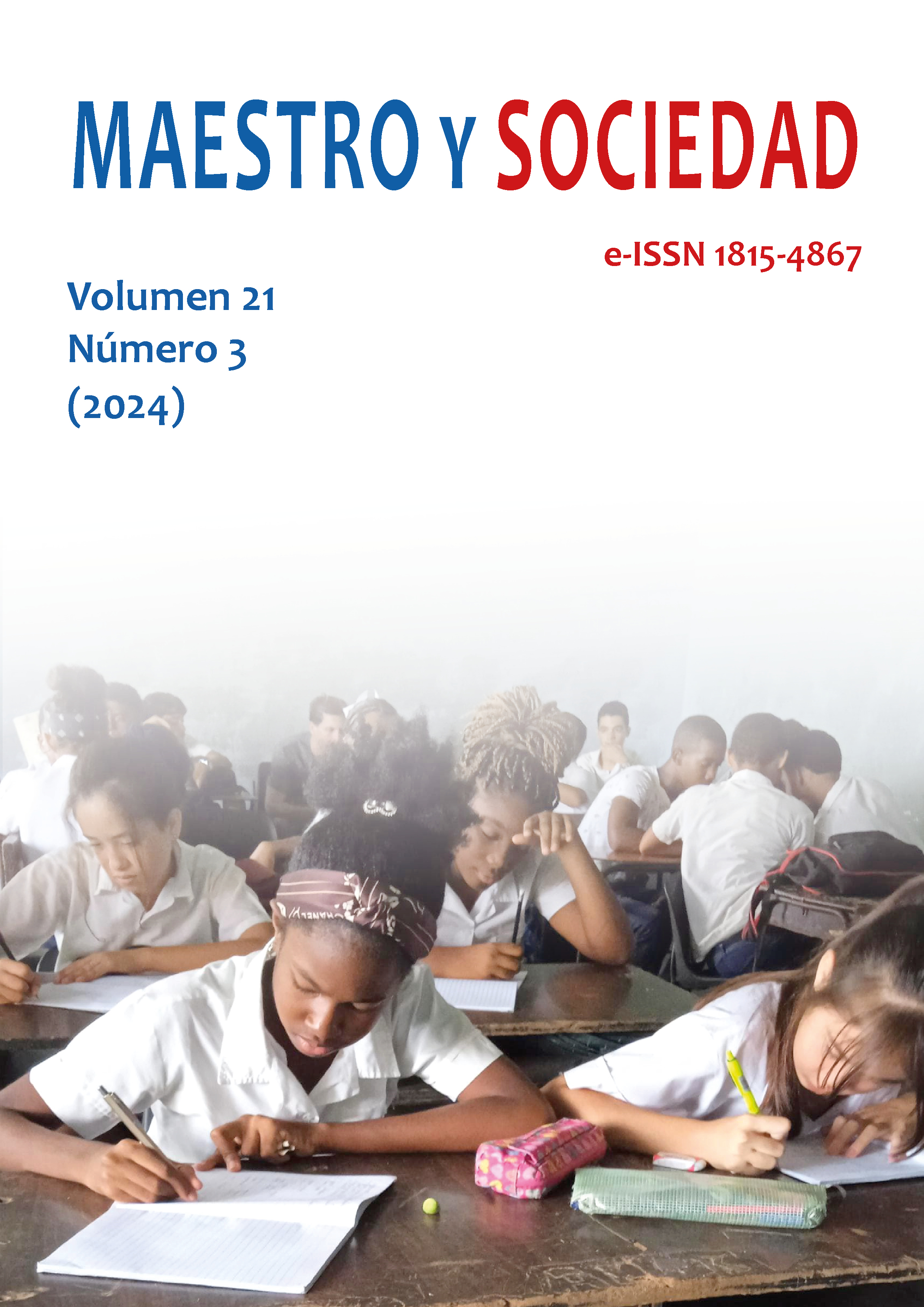PhET simulator and scientific-technical skills in high school students
Keywords:
PhET simulator, Scientific-technical skills, Physics, pedagogical strategies, teachingAbstract
Introduction: The present research focuses on how the PhET simulator improves scientific-technical skills in high school students. The difficulties in teaching Physics and the low results in national assessments, the use of PhET in the study of wave motion is proposed, being the objective to use the PhET simulator as a pedagogical tool for the analysis of wave motion, in order to enhance the scientific-technical skills of students in the third year of unified general high school of the Liceo Policial Educational Unit. Materials and methods: A mixed research approach was used, with a descriptive and at the same time applicative scope, to examine how PhET influences the scientific skills of students. Also, the research is quasi-experimental, with two groups, one experimental and one control, collecting data through tests (Pre-Test and Post-Test) to 70 students and interviews with two teachers. Results: The study revealed significant improvements in students' scientific-technical skills after using the PhET simulator, especially in Data Interpretation and Use of Research Tools and technological instruments. Interviews with teachers confirmed that laboratory practices and technological tools, such as PhET, favor science learning. Discussion: The research reveals that PhET simulators improve the scientific-technical skills of Physics students. The results of the Pre-Test and Post-Test indicate improvements in the understanding and application of knowledge. Interviews with teachers support the integration of these technological tools in teaching, highlighting their positive impact on learning. Conclusions: Scientific-technical skills are strengthened in the study of Physics through the use of the PhET simulator, notably supporting the development of science in third-year high school students.
References
Bohórquez Guevara, V. M. (2024). Desafíos en la Enseñanza de la Física: Análisis a partir de una Revisión Bibliográfica. Ciencia Latina Revista Científica Multidisciplinar, 8(1), 8702-8715. https://doi.org/10.37811/cl_rcm.v8i1.10202
Bravo Faytong Félix Agustín, LiLa Maribel Morán Borja y Eduardo Francisco Baidal Bustamante (2019): “Laboratorio físico vs virtual: preferencia de los estudiantes en el aprendizaje del movimiento rectilíneo uniforme acelerado”, Revista Atlante: Cuadernos de Educación y Desarrollo (octubre 2019). En línea: https://www.eumed.net/rev/atlante/2019/10/laboratorio-fisico-virtual.html
Conejo-Villalobos, M., Arguedas-Matarrita, C., & Concari, S. B. (2019). Difundiendo el uso de laboratorios remotos para la enseñanza de la física: Talleres con docentes y estudiantes. Revista De Enseñanza De La Física, 31, 205–213. Recuperado a partir de https://revistas.unc.edu.ar/index.php/revistaEF/article/view/26547
Duarte J., Niño Vega J., & Fernández Morales F. (2022). Simulando y resolviendo, la teoría voy comprendiendo: una estrategia didáctica para la enseñanza-aprendizaje de la física. (2022). Revista Boletín Redipe, 11(1), 158-173. https://doi.org/10.36260/rbr.v11i1.1634
Godoy R. C., (08 octubre de 2022). Los Métodos Mixtos en investigación: tipos, pros y contras más ejemplos. Tesis de cero a 100. https://tesisdeceroa100.com/los-metodos-mixtos-en-investigacion-tipos-pros-y-contras-ejemplos/
Hernández S.R., y Mendoza T. C. (2018). Metodología de la Investigación: las rutas cuantitativa, cualitativa y mixta. McGRAW-HILL INTERAMERICANA EDITORES, S.A. de C. V. ISBN: 978-1-4562-6096-5. Ciudad de México.
INEVAL, 2023a. Informe Nacional Ser Estudiante-Nivel de Bachillerato. Año lectivo 2022-2023 Quito-Ecuador. https://cloud.evaluacion.gob.ec/dagireportes/sestciclo21/nacional/2022-2023_3.pdf
INEVAL, 2023b. Informe Institucional Ser Estudiante-Nivel de Bachillerato. Año lectivo 2022-2023. 17H00232 - LICEO POLICIAL. Quito-Ecuador. https://cloud.evaluacion.gob.ec/dagireportes/sestciclo21/nacional/2022-2023_3.pdf
Instituto Nacional de Evaluación Educativa (2018). Educación en Ecuador, Resultados de PISA para el Desarrollo. Informe general PISA 2018. https://evaluaciones.evaluacion.gob.ec/BI/informe-general-pisa-2018/
MINEDUC, Ministerio de Educación del Ecuador (2023). Marco Curricular Competencial de Aprendizajes. https://educacion.gob.ec/marco-curricular-competencial-de-aprendizajes/
MINEDUC, Ministerio de Educación del Ecuador (2021). Currículo priorizado con énfasis en competencias comunicacionales, matemáticas, digitales y socioemocionales. https://educacion.gob.ec/curriculo-priorizado/
Pérez, J. J. S. (2018). Aprender física y química jugando con laboratorios virtuales. Anales de Química de la RSEQ, 114(1), 40-40. https://analesdequimica.es/index.php/AnalesQuimica/article/view/1021
PhET Interactive Simulations. (10 de marzo de 2024). Simulaciones Interactivas de Ciencias y Matemáticas. https://phet.colorado.edu/es/
Plano, Miguel; Lerro, Federico; Marchisio, Susana., (2019). Simulaciones como recurso didáctico para el estudio de la física de los dispositivos electrónicos. Revista de enseñanza de la física, ISSN-e 2250-6101, ISSN 0326-7091, Vol. 31, Nº. Extra 1, 2019, págs. 605-611. https://dialnet.unirioja.es/servlet/articulo?codigo=7578717
Quizhpi Moreno, D. A. (2023). El impacto del uso de los simuladores en el proceso de la enseñanza-aprendizaje de la asignatura de física en educación general básica. [Tesis de Maestría, Universidad Politécnica Salesiana del Ecuador]. https://dspace.ups.edu.ec/bitstream/123456789/24937/1/UPS-CT010549.pdf
Real Sociedad Española de Física (2018). El estado de la Enseñanza de la Física en la Educación Secundaria. Informe de la Comisión sobre la Enseñanza de la Física en la Educación Secundaria. https://rsef.es/noticias-actividades-geef/item/1134-el-estado-de-la-ensenanza-de-la-fisica-en-la-educacion-secundaria
Ridge, Brendon V. (2023, diciembre 16). El funcionamiento de un simulador: Todo lo que necesitas saber. https://www.mediummultimedia.com/apps/como-funciona-un-simulador/
Sánchez-Sánchez, I. C., & Sánchez-Noroño, I. V. (2020). Elaboración de un simulador con GeoGebra para la enseñanza de la física. El caso de la ley de coulomb. REAMEC-Rede Amazônica de Educação em Ciências e Matemática. https://repositorio.ufpa.br/bitstream/2011/14384/1/Articulo_ElaboracionSimuladorGeogebra.pdf
Published
How to Cite
Issue
Section
License
Copyright (c) 2024 Inés Alexandra Erazo López, Glencora Teresa Coronel Acosta, Wellington Isaac Maliza Cruz, Félix Agustín Bravo Faytong

This work is licensed under a Creative Commons Attribution-NonCommercial-NoDerivatives 4.0 International License.
This journal provides immediate open access to its content, based on the principle that offering the public free access to research helps a greater global exchange of knowledge. Each author is responsible for the content of each of their articles.



























 Universidad de Oriente
Universidad de Oriente 